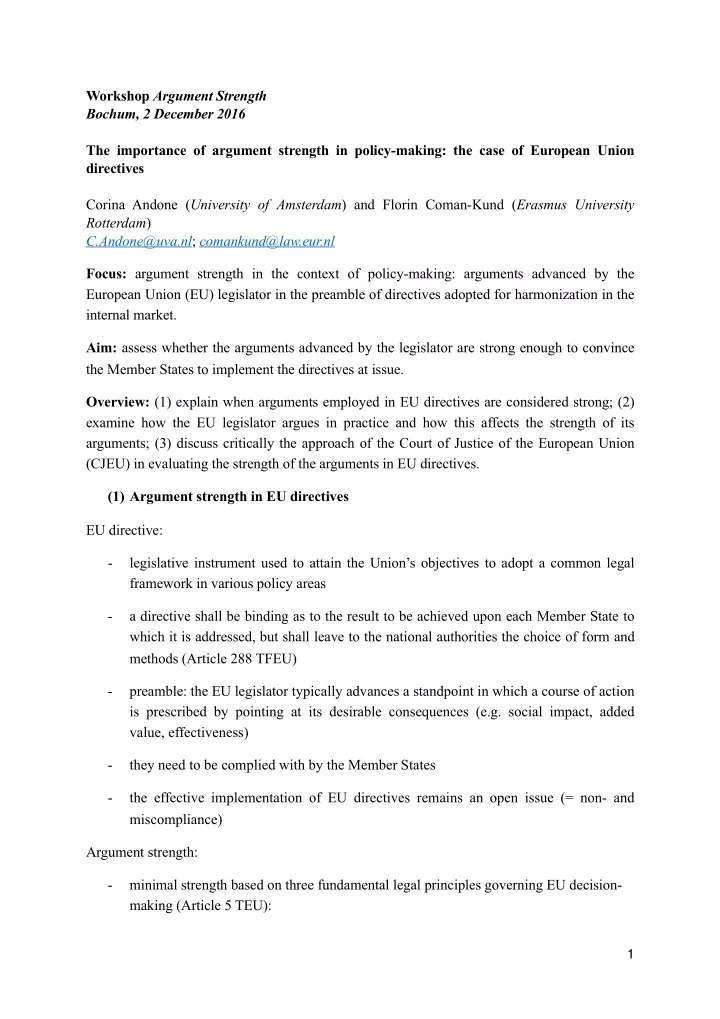

Workshop Argument Strength Bochum, 2 December 2016 The importance of argument strength in policy-making: the case of European Union directives Corina Andone ( University of Amsterdam ) and Florin Coman-Kund ( Erasmus University Rotterdam ) C.Andone@uva.nl ; comankund@law.eur.nl Focus: argument strength in the context of policy-making: arguments advanced by the European Union (EU) legislator in the preamble of directives adopted for harmonization in the internal market. Aim: assess whether the arguments advanced by the legislator are strong enough to convince the Member States to implement the directives at issue. Overview: (1) explain when arguments employed in EU directives are considered strong; (2) examine how the EU legislator argues in practice and how this affects the strength of its arguments; (3) discuss critically the approach of the Court of Justice of the European Union (CJEU) in evaluating the strength of the arguments in EU directives. (1) Argument strength in EU directives EU directive: - legislative instrument used to attain the Union’s objectives to adopt a common legal framework in various policy areas - a directive shall be binding as to the result to be achieved upon each Member State to which it is addressed, but shall leave to the national authorities the choice of form and methods (Article 288 TFEU) - preamble: the EU legislator typically advances a standpoint in which a course of action is prescribed by pointing at its desirable consequences (e.g. social impact, added value, effectiveness) - they need to be complied with by the Member States - the effective implementation of EU directives remains an open issue (= non- and miscompliance) Argument strength: - minimal strength based on three fundamental legal principles governing EU decision- making (Article 5 TEU): 1
(a) the principle of conferral = legal basis on which the decision-making competence rests (b) the principle of subsidiarity = the circumstances in which it is preferable for action to be taken by the Union, rather than the Member States (c) the principle of proportionality = the content and form of the proposed action does not exceed what is necessary to achieve the objectives set by the Treaties (2) Practice and argument strength Case in point: Directive 2011/83/EU on consumer rights intended to attain a high level of consumer protection Arguments: Action X proposed in this directive should be carried out by the Member States There is a problem P at European level that requires a solution There are disparities between certain national provisions Such disparities directly affect the functioning of the internal market Carrying out action X helps to solve the existing problem P at European level It helps ensure legislative coherence and harmonization among Member States Action X is effective It removes the problem completely Removing the problem is desirable This is absolutely necessary for the proper functioning of the EU There are disparities between certain national provisions : inadequate discharge of the burden of proof It helps ensure legislative coherence and harmonization among Member States : this directive is the best and only solution to internal market barriers ‘Duty to state reasons’ (Article 296 TFEU) = the EU legislator must show in a clear and unequivocal manner the reasoning of the author of the act, thereby enabling the persons concerned to ascertain the reasons for it, so that they can defend their rights and ascertain whether or not the measure is well founded, and quite importantly, also enable the Court to exercise its power of review (3) Assessment of argument strength in EU directives by CJEU CJEU states: - under Article 296 TFEU Union’s legal acts need to show ‘clearly and unequivocally’ the reasoning upon which that act is based (Case C-84/94 UK v Council , para 74; Case C-413/04 Parliament v Council , para. 81). 2
- such reasoning fulfils a double function: (1) to enable the persons concerned to determine the reasons of the measure and (2) to enable judicial review by the Court. CJEU’s assessment: - it applies a flexible ‘statement of reasons’ test - the problematic legislative practice remains generally unsanctioned due to the rather light and flexible test used by CJEU under Article 296 TFEU. 3
Recommend
More recommend